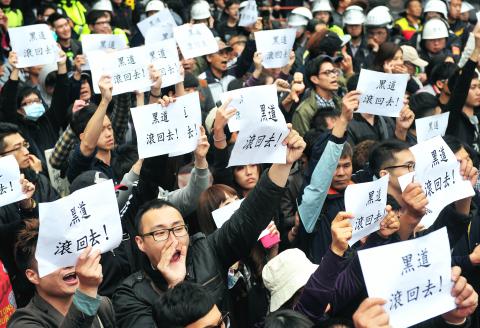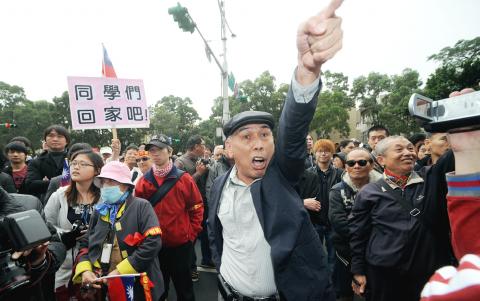The political deadlock between students occupying the Legislative Yuan and President Ma Ying-jeou (馬英九) is unlikely to end soon, because Ma is not willing to concede and has been evading the students’ demands, Democratic Progressive Party (DPP) officials said yesterday.
“When students demanded the organization of a citizens’ constitutional conference, Ma said he would convene a national trade conference instead. Knowing Ma, that was the kind of thing he always did — evading the core issue and shifting the focus to something else,” DPP Policy Research Committee executive director Joseph Wu (吳釗燮) said.
“Getting right to the point is not Ma’s style,” Wu said.

Photo: Chien Jung-fong, Taipei Times
While the DPP supports the causes and demands of the Sunflower movement — which has captured the country’s attention since the students stormed and occupied the legislative floor on March 18, and asked the government to withdraw and renegotiate the controversial deal amid concern it would severely undermine Taiwan’s economy — the party currently has no plan to intervene in the movement, Wu said.
The DPP has been playing a supporting role in the movement and has no plan to change that, Wu said.
Department of International Affairs director Liu Shih-chung (劉世忠) said the biggest concern now is that Ma has no exit strategy and does not appear to plan one.

Photo: Liu Hsin-de, Taipei Times
“It seems like he would keep on playing the China card, trying to reassure people that everything would be fine after the trade pact takes effect,” Liu said.
“However, for some people, their worst fear is not how Ma would deal with pressure from China, but that the president has already established some sort of collaborative partnership with Beijing,” he added.
One of Ma’s biggest mistakes in the controversy is that he is still convinced that Taiwanese believe that economics and politics can be separated in dealing with cross-strait issues, Liu said.
That may have been the case before, but the ongoing mass protest shows that the public has come to realize that the service trade agreement would have greater political than economic implications, Liu said.
The DPP’s counterproposal to the service trade agreement has been relatively underreported since the student movement became the center of attention two weeks ago, DPP Department of China Affairs director Honigmann Hong (洪財隆) said.
After a comprehensive review and discussion with its think tank, the party recommended that at least 24 items on the trade agreement’s sector-specific commitment list — including banking, printing and publishing, and Type II telecommunications — should be reconsidered, he said.
Hong added that the DPP has never opposed free trade and signing free-trade agreements with other countries, but pursuing trade liberalization with China — which has not ruled out annexing Taiwan by force if necessary — requires greater scrutiny and transparency.

Tropical Storm Gaemi strengthened into a typhoon at 2pm yesterday, and could make landfall in Yilan County tomorrow, the Central Weather Administration (CWA) said yesterday. The agency was scheduled to issue a sea warning at 11:30pm yesterday, and could issue a land warning later today. Gaemi was moving north-northwest at 4kph, carrying maximum sustained winds near its center of up to 118.8kph and gusts of 154.8kph. The circumference is forecast to reach eastern Taiwan tomorrow morning, with the center making landfall in Yilan County later that night before departing from the north coast, CWA weather forecaster Kuan Shin-ping (官欣平) said yesterday. Uncertainty remains and

SEA WARNING LIKELY: The storm, named Gaemi, could become a moderate typhoon on Wednesday or Thursday, with the Taipei City Government preparing for flooding A tropical depression east of the Philippines developed into a tropical storm named Gaemi at 2pm yesterday, and was moving toward eastern Taiwan, the Central Weather Administration (CWA) said. Gaemi could begin to affect Taiwan proper on Tuesday, lasting until Friday, and could develop into a moderate typhoon on Wednesday or Thursday, it said. A sea warning for Gaemi could be issued as early as Tuesday morning, it added. Gaemi, the third tropical storm in the Pacific Ocean this typhoon season, is projected to begin moving northwest today, and be closest to Taiwan on Wednesday or Thursday, the agency said. Today, there would likely

DISRUPTIONS: The high-speed rail is to operate as normal, while several airlines either canceled flights or announced early departures or late arrivals Schools and offices in 15 cities and counties are to be closed today due to Typhoon Gaemi, local governments announced last night. The 15 are: Taipei, New Taipei City, Taoyuan, Tainan, Keelung, Hsinchu and Kaohsiung, as well as Yilan, Hualien, Hsinchu, Miaoli, Chiayi, Pingtung, Penghu and Lienchiang counties. People should brace for torrential rainfall brought by the storm, with its center forecast to make landfall on the east coast between tonight and tomorrow morning, the Central Weather Administration (CWA) said. The agency issued a sea warning for the typhoon at 11:30pm on Monday, followed by a land warning at 11:30am yesterday. As of

CASUALTY: A 70-year-old woman was killed by a falling tree in Kaohsiung as the premier warned all government agencies to remain on high alert for the next 24 hours Schools and offices nationwide are to be closed for a second day today as Typhoon Gaemi crosses over the nation, bringing torrential rain and whipping winds. Gaemi was forecast to make landfall late last night. From Tuesday night, its outer band brought substantial rainfall and strong winds to the nation. As of 6:15pm last night, the typhoon’s center was 20km southeast of Hualien County, Central Weather Administration (CWA) data showed. It was moving at 19kph and had a radius of 250km. As of 3pm yesterday, one woman had died, while 58 people were injured, the Central Emergency Operation Center said. The 70-year-old